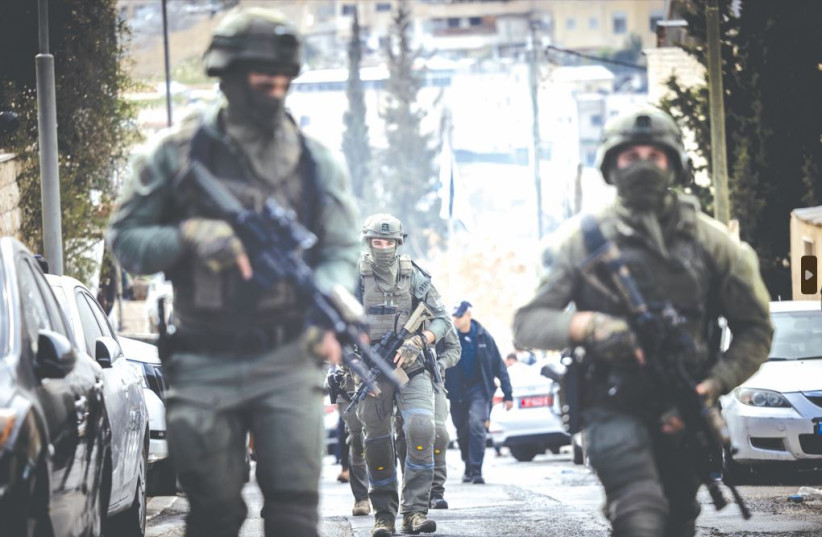Social media platforms, including TikTok, the popular Chinese short-form video hosting service, are one of the main reasons behind the involvement of children in terror attacks, Palestinians said on Thursday.
“The children are influenced by videos and posts they see on social media,” said Ibrahim Odeh, a political activist from east Jerusalem. “Every child has a smartphone or a computer, where they are exposed to all kinds of things.”
The involvement of three children aged 13 and 14 in the recent attacks in Jerusalem did not surprise many Palestinians, Odeh said. “The children watch videos of gunmen from Jenin and Nablus, and some want to be like them. They want to imitate the gunmen and other people who carry out attacks.”
“The children are influenced by videos and posts they see on social media. Every child has a smartphone or a computer, where they are exposed to all kinds of things.”
Ibrahim Odeh
In Silwan, a 13-year-old boy opened fire at a group of Israelis, seriously injuring a father and his son. The attack took place in late January, the day after Khairy Alqam, a 21-year-old resident of east Jerusalem, killed seven Israelis in a shooting attack in the neighborhood of Neve Yaakov. Alqam was shot dead by police officers.
Palestinians believe the attack in Neve Yaakov came in response to the killing of nine Palestinians, mostly gunmen, during an Israeli security operation in the Jenin refugee camp.

It’s unclear whether the shooting in Silwan was inspired by the Neve Yaakov attack or came in response to calls by Palestinian factions to avenge the killings in Jenin.
Residents of Silwan, however, said they did not rule out the possibility that the 13-year-old assailant carried out the attack in response to Israeli “provocations,” including house demolitions and visits by Jews to al-Aqsa Mosque compound (the Temple Mount). The visits are portrayed by Palestinians as a “storming by Jewish settlers and extremists.” The Jewish visitors are also accused of “defiling” the mosque grounds.
As such, the Palestinians, including children, are told that it’s a religious duty to “defend” the Islamic holy sites against Israeli “aggression.”
“The children in Silwan face many provocations by policemen and Jewish settlers,” said a resident of the neighborhood. The “settlers” he referred to are the Jews living in the nearby City of David.
Residents claimed that scuffles between Jews and Arab teenagers are not uncommon in Silwan. Similarly, clashes between teenagers and police officers occur almost every night.
In late January, Wadi Aziz Abu Ramouz, 17, died of wounds he suffered earlier during clashes with policemen there.
Scenes of teenagers and children throwing stones and Molotov cocktails or launching fireworks at police officers and vehicles in several parts of east Jerusalem are common.
Terror attacks and arrests
In the past year, police have arrested dozens of teenagers on suspicion of participating in such attacks. Some were jailed; others were placed under house arrest.
In the past week, two children were involved in stabbing attacks in the Old City and the Shuafat refugee camp in northern Jerusalem.
In the first incident, an Israeli teenager was wounded. Police arrested a 14-year-old boy from the camp on suspicion of carrying out the attack. In the second incident, a 13-year-old boy, also from Shuafat camp, stabbed Border Police officer Asil Suaed, who was also accidentally shot by a civilian security guard, according to police. Suaed later succumbed to his wounds.
The three children who carried out the attacks in Jerusalem were not affiliated with any Palestinian faction. Rather, they acted as “lone wolves” after being exposed to the ongoing incitement against Israel, particularly on social media and in the immediate environment of their homes and schools.
Like many Palestinians, the children watch the gunmen from the Nablus-based Lions’ Den armed group and the Jenin Battalion as they engage Israeli troops. The gunmen, hailed as “heroes” and “martyrs,” have become role models for many young Palestinians. So have other Palestinians who carry out stabbing, shooting and car-ramming attacks.
In Nablus and Jenin, Palestinian minors are said to have been recruited by some of the armed groups to be on the lookout for Israeli soldiers or to transfer weapons and explosive devices from one place to another.
“This is a disturbing phenomenon,” remarked a veteran east Jerusalem schoolteacher. “What’s even more annoying is that you don’t see people coming out in public against the exploitation of the children or their involvement in the violence.”
